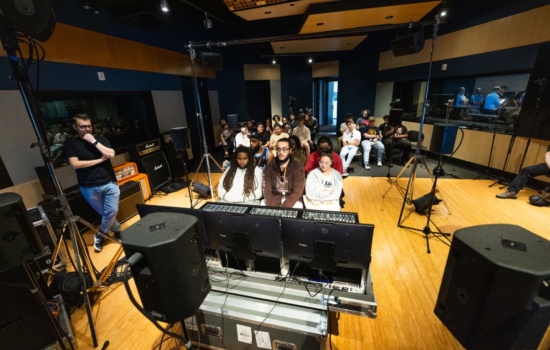Choreographer

How To Become a Choreographer
Career Description
Choreographers create original dances that tell a story through movement. They, or their Assistant, then teach the steps to the dance company, which the Choreographer both casts and supervises in rehearsals.
When it comes to daily work, “things change hourly, minutely,” Dancer and Choreographer Desi Jevon says. “Things change from the dance studio to set, and you have to tell people that everything they’ve been rehearsing for eight hours a day, for eight days straight, now you have to reverse it.”
The main job of the Choreographer then is to “not stress out, go with the flow and get it done. Be a Therapist. And get the Dancers as prepared as possible.”
Depending on the project, a choreographer will work with Dancers, Agents, Casting Directors, production teams, and sometimes Musical Artists.
Salary
Choreographers, on average, earn approximately $48,700 annually. The salary range for Choreographers runs from $38,000 to $61,000.
Earnings are made on a project-by-project basis. Income also depends on how big your name is. “There’s no set rate like in SAG [Screen Actors Guild], but that’s where your agent comes in,” says Jevon. Earnings for a project can range anywhere from $500-$20,000.
Hey, what do you think about trying our new Music Career HelperMusic Career Helper really quick? It’s totally free and could help get your career moving fast! Give it a try. It’s totally free and you have nothing to lose.
Career Outlook
“Hours can vary,” Jevon says. “Sometimes I’m choreographing at 4 am. As an artist, we go when we’re inspired. I could be coming home from a club, hear a song, and I’m inspired.”
The amount of time spent on a project and the schedule can also depend on the needs of the production team with whom the Choreographer is working. “It can be the night before and you still don’t have the music or it hasn’t been cleared yet and you need to teach the routine at 9 am,” he says.
Some days a Choreographer might work fourteen hours—other days he or she might work only a few. It all depends on the needs of the production. For example, if opening night of a play or concert tour is the next day, a Choreographer could be working overtime to perfect the performance. “You’re working twelve hours a day, sometimes you’re losing your voice and your body hurts,” he explains.
Career Path
A Choreographer almost always starts his or her career as a Dancer. The next step up is to work as an Assistant Choreographer, which means that “the Choreographer teaches you, you then teach the Dancers, and the Choreographer cleans it up,” according to Jevon.
The next step is to become an Associate Choreographer, which means that “you contributed steps.” The next spot in the hierarchy is the Choreographer; from this position, he or she can advance to become the Creative Director. The Creative Director molds the performance but does not come up with the steps.
So how does an aspiring Choreographer get a job? Jevon advises, “if you can ever get to assist anybody, that is the best way ever. Some of my favorite Choreographers ever started off as Assistants to amazing Choreographers. They [Choreographers] need you as well. They don’t want to show the dance over and over again. You’re their second eye. They trust you. You’re learning, and sometimes you’ll be able to add in your own steps.”
- “Start teaching. It gets your name out there.”
- “Put your choreography on tape. Use your class or set up a shoot.”
- “Choreograph whatever you can get your hands on.”
- “Collect footage and put it together to get a reel. Shop it around to agents or submit online by yourself. Sometimes there are jobs on sites like Actors Access or LA Casting.”
- “Have a link [to your work] in case you meet someone who’s like ‘I’m shooting a commercial and I need a Choreographer.’ You can be like, ‘Here’s my link.’”
Experience & Skills
Dance experience and teaching experience are essential because you need to be able to “translate what’s in your head to the dancers,” Jevon says. An aspiring Choreographer needs to have had the experience of teaching steps to others, and resume-wise, to have worked as an Associate and an Assistant Choreographer.
As for skills, a Choreographer needs to have a Director’s eye, the ability to teach and be able to work well with others. “I’m conscious of how I’d want to be treated. When a Choreographer isn’t clear, the Dancers aren’t clear.” They need to know which parts of the dance have “freedom in it,” which parts are “exactly what it is,” and which parts are “where you can have fun and make it your own.”
He adds, “They don’t necessarily have to be the best Dancer. The best Dancer isn’t necessarily the best Choreographer, and the best Choreographer isn’t necessarily the best Dancer.”
Jevon describes the type of person who makes a great Choreographer as “creative,” and someone “who loves a challenge.” A Choreographer must be ok with a certain degree of flexibility in his or her life, as projects can run long hours, take place at strange times, and not always come as steadily as one might like.
Education & Training
While dance is a major at many colleges and universities, the majority of Dancers learn in the studio. Jevon himself is a little unusual in this regard; he has no formal training and was never in a dance class. He learned partner dances like the mambo from his family, who would dance together at parties.
Choreography is available as a major at some colleges, but most Choreographers are Dancers who learned on the job. Jevon says he “observed Choreographers and what their job was, being the middle person between the Dancers and the production team.”
Additional Resources
The Stage Directors and Choreographers Society exists to help theatrical Choreographers, but for Choreographers who work on concert tours or film/TV, no union exists.
FAQ
What is the single biggest suggestion you would give to someone wanting to get into this career?
Two things. “Think outside of the box. Those are the dance numbers that stand out.” And “watch old choreography. A long time ago there were no visual effects so they had to be extra creative with just dance steps.”
What’s the #1 mistake people make when trying to get into this career?
“Just worrying about the steps and not telling the story and not thinking about what needs to happen in the scenario. See what reads on the camera or in the back row of a theatre. They’re not getting the big picture.”
What is the question people should ask about this career but rarely do?
“They don’t read the scripts or stories to know what the story is about.”
What is one thing I should have asked which I didn’t?
“I feel like you asked everything.”
If you could describe in one word what makes you successful, what would it be?
“Creativity.”
Sources

Desi Jevon
Desi Jevon is a Los Angeles based Dancer, Choreographer and Actor. He has trained contestants for Dancing with the Stars and So You Think You Can Dance. He was also featured in the print and commercial campaign for SYTYCD.
As a dancer, he has toured and/or performed with Gloria Estefan, Toni Braxton, Alicia Keys, Selena Gomez, Brian Setzer Orchestra. He has performed on Castle, Wizards of Waverly Place, Saturday Night Live and both the Kids’ Choice Awards and Teen Choice Awards.
He has choreographed shows for Celebrity Cruises, the Best of Ballroom Live show tour, Mi Sueno es Bailar (the Spanish language DWTS), USA TV’s The Moment, and has served as an Associate Choreographer for Bravo’s Step It Up and Dance and as an Assistant Choreographer for the Spice Girls’ reunion tour. His first salsa instructional DVD was released Fall 2014. He teaches dance at the EDGE Performing Arts Center.
For a glimpse of his dance and choreography work, check out these videos from Athletic Garage’s World of Dance Showcase, Choreographer’s Carnival, and EDGE.
References
- 1Multiple. "Choreographer Salaries in United States". Glassdoor. published: Mar 14, 2017. retrieved on: Dec 16, 2019






















